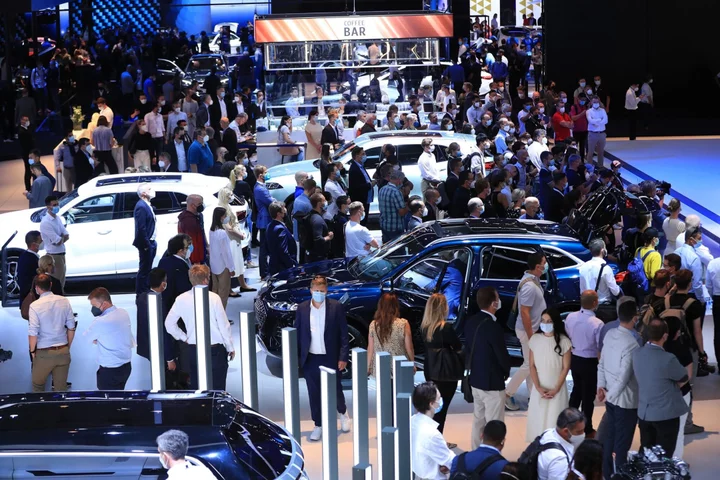The I- in IAA, the name of Germany’s annual auto show, stands for international. This year’s event is leaning into that billing like never before.
Half of the companies at next week’s Internationale Automobil-Ausstellung in Munich will be foreign, with 41% of exhibitors coming from Asia. The ranks of Chinese manufacturers in attendance — which includes electric-car makers BYD Co., Nio Inc. and Xpeng Inc. — will more than double compared to just two years ago.
Germany staging its least-German motor show is fitting, considering the breakneck speed at which China has emerged as an automotive exporter. In addition to occupying more exhibition center space, the nation’s carmakers are taking up more of the attention span of management at Volkswagen AG, Mercedes-Benz Group AG and BMW AG, whose businesses rely heavily on the two economic powerhouses that are looking increasingly shaky.
“The big Chinese presence at IAA represents a push into the heart of the European auto market, and one the local manufacturers shouldn’t underestimate,” said Peter Fintl, a consultant with Capgemini Engineering. “China’s companies are coming with highly competitive cars that are designed and built to appeal to Western buyers.”
Chinese automakers have been rolling out EVs at a blistering pace and are expanding abroad as a fierce price war rages at home. The Germans, meanwhile, are under pressure to speed up development as software issues have delayed key new models. Inflationary pressures, a dearth of skilled workers and high energy prices across Europe are adding to their structural challenges.
While China’s manufacturers have largely lagged behind foreigners selling gasoline-powered cars, government subsidies and the country’s growing ranks of coders have helped them build a head start on the latest in electric and digital technology. They’re also benefiting from lower production costs and a world-beating battery supply chain.
BYD, which this year leapfrogged VW as China’s top-selling car brand, is showing off cars at IAA including the Seal U sport utility vehicle, its sixth model introduced for the European market in less than a year. Avatr, the premium EV venture owned by state-owned Changan Auto and the biggest EV battery producer CATL, will be unwrapping the 12 sedan, its first model launch outside China. MG, the British brand now owned by China’s SAIC, plans to present its two-seater electric roadster, the Cyberster.
The Germans will answer with EVs including VW’s ID.7 sedan, which comes with an augmented-reality display that beams information into the driver’s field of vision and starts at around €57,000 ($62,000). VW, BMW and Mercedes are bringing additional electric cars to Munich, but their next-generation vehicles won’t be available until around mid-decade. BMW will unveil a prototype previewing its “Neue Klasse” EV platform, which is expected to underpin models going on sale around 2025.
For all the advances they’re making overseas, several Chinese EV startups are struggling financially because of the stuttering economy and intensifying price war at home. They’re also lacking the dealership and marketing infrastructure the European incumbents have built up over decades, potentially complicating their sales push in the region.
But the Germans aren’t just competing with the Chinese — several are working with their challengers to gain access to new technology, as well as consumers, in the world’s biggest auto market. VW in July unveiled plans to invest $700 million in Xpeng, the fourth carmaker with which it has a partnership in China. Mercedes has been cooperating with BAIC, while BMW is tapping Great Wall technology for the new electric Mini Cooper it plans to unveil.
“Europe’s carmakers haven’t been sitting idle, but time is running out as the EV market takes off,” Fintl said. “The good news is that the pressure to scale up applies to everyone — including the Chinese.”
--With assistance from Linda Lew.









